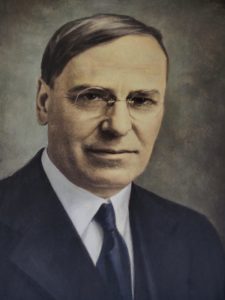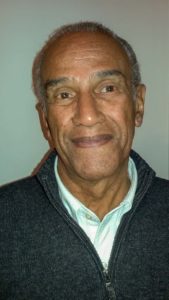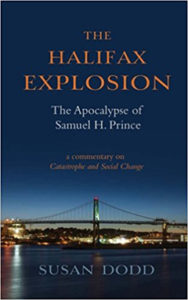One hundred and one years ago, Samuel Prince (1886-1960) was a young curate at Saint Paul’s Anglican Church in Halifax when the Halifax Explosion struck. The budding social scientist and clergyman witnessed the greatest manmade explosion prior to the atom bomb, describing it as “blowing Halifax into the 20th century.” Prince wrote his doctoral dissertation at Columbia University on the Halifax Explosion, which was published as a book called Catastrophe and Social Change. King’s professor Dr. Susan Dodd, also a disaster sociologist like Prince, wrote a commentary on Prince’s dissertation called The Halifax Explosion, The Apocalypse of Samuel H. Prince, which was published as a book on the 100th anniversary of the Halifax Explosion. Now, a year later, Dr. Dodd reflects again on Samuel Prince’s influence and legacy, especially in light of King’s recent announcement that it has re-established the Prince Scholarship for African-Nova Scotian students in recognition of Prince’s pre-eminence in the spheres of education and community leadership.
Dining in “Prince Hall” in my first year as a Foundation Year Program (FYP) Tutor, a colleague noted that I should be pleased to inherit the role of King’s disaster sociologist from the dining hall’s namesake, Samuel H. Prince. Intrigued, I found and read his 1920 book Catastrophe and Social Change: Based Upon A Sociological Study of the Halifax Disaster. A published version of his doctoral dissertation from Columbia University, Prince’s book is often considered the first-ever work in the field of disaster studies, and an early work in group psychology.

Samuel H. Prince.
Samuel H. Prince lived and taught at King’s for decades, and was a pioneer of social work, sociology, and the reform of institutions like prisons and homes for various excluded and isolated groups. Prince was a dynamo of social activism, enacted through the emerging social programs of the welfare state. (To learn even more about Samuel Prince, you’re invited to read Dr. Henry Roper’s address.)
As the 100th anniversary of the Halifax Explosion approached, I determined to do a close reading of Prince’s text. At the time of the Halifax Explosion, Samuel Prince was a priest at Saint Paul’s Anglican Church in Halifax’s Grand Parade, and he was forever marked by the disaster and its aftermath. The ferocious winter weather that hit the devastated city turned his attention to the need for affordable and comfortable housing for all members of society, and the rebuilding of Halifax’s North End showed him new possibilities for town planning. Passionate about improving the material conditions of life for the marginalized and excluded, Prince was a life-long champion of inclusive social programming.

“King’s was the first place where I felt really comfortable and truly accepted.”—David Jones, 1960 Prince Scholarship recipient
 Perhaps the most interesting aspect of Catastrophe and Social Change for me was that it links Prince clearly with the later Social Gospel movement (a religious movement that arose during the second half of the 19th century when clergy began to tie salvation and good works together) and the introduction of social science to Canada via church outreach work. My older presuppositions about a separation or even antagonism between social science and religion were overturned. This influenced my consideration of Prince’s account of the explosion and what both the explosion and witnessing can teach us a hundred years on as described in The Halifax Explosion, The Apocalypse of Samuel H. Prince.
Perhaps the most interesting aspect of Catastrophe and Social Change for me was that it links Prince clearly with the later Social Gospel movement (a religious movement that arose during the second half of the 19th century when clergy began to tie salvation and good works together) and the introduction of social science to Canada via church outreach work. My older presuppositions about a separation or even antagonism between social science and religion were overturned. This influenced my consideration of Prince’s account of the explosion and what both the explosion and witnessing can teach us a hundred years on as described in The Halifax Explosion, The Apocalypse of Samuel H. Prince.
The first-ever scholarship for African-Nova Scotians at King’s was named in Prince’s honour. It was available for 10 years through the 1960s but when its benefactor died, the funding ceased. Now endowed for perpetuity, the scholarship is currently valued at $6,000 and will be renewable for four years, bringing the total value of the scholarship to $24,000 over four years. It will again be awarded to African-Nova Scotian students entering the Foundation Year Program and pursuing a degree in arts, science, journalism (honours) or music.
It is great news that the Prince Scholarship has been revived, as an encouragement to African-Nova Scotians to come to King’s (joining the Carrie Best Scholarship in this) and also as a call to service in the wider Halifax community for everyone at King’s.
Dr. Susan Dodd is an associate professor in the Foundation Year, the author of two studies in disaster sociology: The Ocean Ranger: remaking the promise of oil, and The Halifax Explosion: The Apocalypse of Samuel H. Prince—a commentary on Catastrophe and Social Change, a founding board and faculty member of the Halifax Humanities, and a teacher and board member of the Burnside Humanities Education Program.

